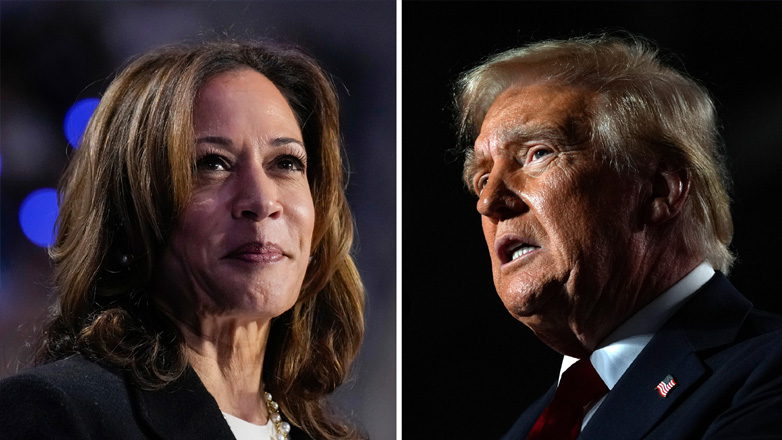The day of judgment for the US has arrived… Millions of Americans are expected to go to the polls on Tuesday to vote in the 2024 United States presidential election, in which Democratic candidate Kamala Harris and her Republican opponent, Donald Trump, face off in an inconclusive battle, vote for vote.
About 230 million citizens are eligible to vote, but only about 160 million of them are registered. Almost half of the 50 states in the United States, however, allow today’s registration.
ADVERTISING SPACE
More than 70 million people have already voted by mail or at early in-person polling stations.
The States that will judge the winner
Analysts are turning their attention to the swing states, which they believe will elect a winner and which could be won by either the Democratic or the Republican candidate.
In particular, Arizona, Georgia, Michigan, Nevada, North Carolina, Pennsylvania and Wisconsin stand out, where the candidates, according to the polls, also move within the limits of statistical error in some cases.
ADVERTISING SPACE
Deciphering the electorate has proven in this election to be much more complex than in the past. And this is because the seals seem to have been broken and both candidates have managed to penetrate their opponent’s voter pools.
Voters are also called upon to elect 34 US senators (out of 100) and the 435 members of the US House of Representatives. In addition, gubernatorial elections will be held in 11 states and two US territories (Puerto Rico and American Samoa).
ADVERTISING SPACE
When do the polls open and close?
The US spans six time zones. Using US Eastern Time (ET), voting will begin at 5 AM. (10:00 GMT-12:00 Greek time) on Tuesday and will last until 1 am. (06:00 GMT-08:00 Greek time) on Wednesday.
17:00 on Tuesday ET – 00:00 on Wednesday (Greece time)
The polls will not have closed, but after this time the first exit poll reports will begin.
19:00 ET – 02:00 Wednesday (Greece time)
Polls close nationwide in the first six states, including Georgia, which has 16 electoral votes.
It is also important to note that polls in some areas of Indiana and Kentucky close earlier, at 18:00 ET – 01:00 Greek time. It will take some time for the forecasts in these states.
Trump disputed the outcome of the 2020 election in Georgia. He was later charged with interfering in the elections there. False allegations of electoral fraud are already circulating in the key state in this election. Indiana, Kentucky and South Carolina are leaning toward Trump, while Virginia and Vermont are expected to go to Harris.
Most polls also close in Florida at 19:00 – 02:00 Greek time. No statewide projections will be made before all polls in a state are closed.
19:30 ET – 02:30 (Greece time)
Polls are closing in another battleground, North Carolina, as well as two red states.
In 2020 North Carolina, Trump won the state by 1.3 percentage points over Biden, and in 2016, Trump won the state by 3.6 percentage points over Democrat Hillary Rodham Clinton. From 1980 to 2020, Republicans won North Carolina in every primary except 2008, when Democrat Barack Obama beat John McCain by 0.3 percentage points. Ohio and West Virginia historically vote Republican, and Trump is expected to win both states.

20:00 ET – 03:00 (Greece time)
Polls in 17 states, including Pennsylvania, the most populous of the blue-wall industrial states where Trump is trying to wrest back from Democrats after winning them in 2016 and losing them in 2020.
In Pennsylvania, Biden won by 1.2 percentage points in 2020. In 2016, Trump beat Clinton by 0.7 percentage points. After the Democratic victory in 1976, the Republicans swept the state from 1980 to 1988. From 1992 to 2012, the Democrats won Pennsylvania.
20:30 ET – 03:30 (Greece time)
Polls close in Arkansas, which has 6 electors and is likely to support Trump. The polls will have closed in half the states.
21:00 ET – 04:00 (Greece time
Polls are closing in 15 states, including districts in Arizona, Michigan and Wisconsin. Polls will also close in some of the most populous states, such as Texas and New York.
From 1976 to 2020, Republicans won Arizona in every primary except 1996 and 2020. In 2020, Biden beat Trump by 0.3 percentage points. In 2016, Trump beat Clinton by 3.6 percentage points. From 1992 to 2020, Michigan has been blue for Democrats in every contest except 2016, when Trump beat Clinton by 0.2 percentage points. In 2020, Biden beat Trump in the state by 2.8 percentage points. But U.S. support for Israel’s war on Gaza could swing significant numbers of Arab-American voters in the state toward Trump or the Green Party’s Jill Stein. Wisconsin has also historically turned blue, doing so in every election from 1988 to 2020 except 2016, when Trump beat Clinton by 0.7 percentage points. In 2020, Biden won the state by 0.7 percentage points.
22:00 ET – 05:00 (Greece time)
Polls are closing in three states, including the last battleground state, Nevada. Montana and Utah are expected to go to Trump. Nevada, however, a swing state. While Republicans won the state from 1976 to 1988, Democrats have won there since 2008. In 2020, Biden won by 2.4 percentage points. In 2016, Clinton beat Trump by 2.4 percentage points.
23:00 ET – 06:00 (Greece time)
Polls close in four states, representing a potential harvest of Democratic votes. Idaho, California, Oregon and Washington.
California is the most populous US state and is expected to go to Harris, who is a California native who has represented the state in the US Senate and served as attorney general. From 1992 to 2020, Democrats have won comfortably in California. Oregon and Washington are also likely to see Harris win, while Idaho is expected to go to Trump.
00:00 ET and 01:00 ET on Wednesday – 07:00, 08:00 (Greece time)
Polls close in the state of Hawaii at 12:00 AM ET and in the state of Alaska at 12:00 AM ET. The last polls close in Alaska’s Aleutian Islands.
Trump is expected to win in Alaska, while Harris is expected to win in Hawaii.
Kamala Harris voters: “If she doesn’t win, we’re lost”
‘If he doesn’t win, we’re lost’: like Robin Matthews, many Democratic voters queuing to get into the venue where Kamala Harris would deliver her final campaign speech on Monday in Philadelphia fear the return of the ‘out of control’ Donald Trump in the White House and they say that their hope is that the deep division of Americans will end.
On the boulevard that passes in front of the Philadelphia Museum of Art, in front of which the vice president was to speak in the evening (local time; in the early hours of the morning in Greece), a few hours before the polls opened later today, the crowd was impressive and the queues enormous.
“I’m cautiously optimistic, but I’m worried,” summed up Robin Matthews, a 50-year-old grassroots activist in Pennsylvania, a state that will decide the outcome of today’s election.
“Because if he doesn’t win, we’re lost. Completely. He (Donald Trump) will destroy everything. It is out of control, there are no longer any control mechanisms” of his power, he continued. Next to her, her sixteen-year-old son, Asher, stepped in to make a bid: what is being judged in today’s election, he stressed, is “the preservation of our democratic system.”

Percussion could be heard from musicians trying to create an atmosphere ahead of the gathering, where stars such as Lady Gaga or Oprah Winfrey were expected to participate, in front of the steps of the famous museum that Sylvester Stallone used to climb in a Rocky movie scene.
As a long campaign marked by unprecedented upheavals ends in an America more divided than ever, accounting firm executive Yvonne Tinsley, 35, makes no secret that what she wants is “to get this all over with.”
She said she was fed up with TV political ads and tired of explaining to her friends and acquaintances that you can’t find the news in videos on Facebook and Instagram.
He is not expecting any political miracles from Ms. Harris. “I know it won’t change everything,” he explained. But too much is at stake if the Republican former president returns to the White House.
“I’m a black woman in America, so unfortunately, all the policies are about me differently”—they hit her the most—she emphasized. “If we go back to a world where they don’t even listen to white people, it’s certain that I will be heard even less.”
“We’ve had (President) Trump for four years, everything has fallen apart,” said Robert Rudolph, a 58-year-old developer. “We had plenty of racism, misogyny. It turned them into a commonplace, I hope we stay away from them.”
With a cap that read “Harris-Walls” on his head, he emphasized that he comes from a rural, “red” corner of the state. “We are increasingly divided. It’s really hard to talk to people on the other side,” he noted.
The atmosphere of tension, fears Roxana Rowe, a teacher who went with her two daughters, will continue long after the election. “Trump is already saying he was robbed (of the victory) before the election even took place,” he sighed.
Trump: “If elected I will impose tariffs on Mexico and China to stop fentanyl”
Republican presidential candidate Donald Trump warned on Monday that if he returns to the White House, he will move to impose punitive tariffs on imports from Mexico and China if they do not take action to stop the trafficking of fentanyl to the USA.

In a speech in Pittsburgh, Pennsylvania, Mr. Trump assured that he would take immediate action to crack down on drug trafficking into his country through Mexican territory and would use tariffs as leverage.
“We will immediately stop the drugs flooding us across our borders,” he announced.
He said he would move to impose additional 25% tariffs on Mexican goods and do “the same thing in China” to stop fentanyl trafficking.
“Every damn thing they sell in the US will have (an additional duty of) 25% until they stop drugs coming in. And let me tell you something, the drugs will wear off so fast it will make your head spin,” he added.
Donald Trump also repeated in his speech his declaration that he will proceed with mass deportation of immigrants in case he wins today’s election.
Source: www.zougla.gr


